- Home
- David Gemmell
Drenai Saga 01 - Legend Page 11
Drenai Saga 01 - Legend Read online
Page 11
“News should be in later. Sybad always gets letters.”
“Yes. I’ve been here only two weeks and yet I miss the family terribly,” said Bregan. “I only joined up on the spur of the moment, Gil. That officer’s speech just got to me, I suppose.”
Gilad had heard it before—almost every day for the two weeks since first they had been issued with armor. Bregan should not be at Delnoch, he knew; he was tough enough, but in a way he lacked the heart. He was a farmer, a man who loved growing things. To destroy was alien to him.
“By the way,” said Bregan suddenly, his face echoing his excitement, “you’ll never guess who’s just arrived!”
“Who?”
“Druss the Legend. Can you believe it?”
“Are you sure, Bregan? I thought he was dead.”
“No. He arrived an hour ago. The whole mess hall is buzzing with the news. They say he’s bringing five thousand archers and a legion of axmen.”
“Don’t count on it, my friend,” said Gilad. “I’ve not been here long, but I would like a copper coin for every story I’ve heard about reinforcements, peace plans, treaties, and leave.”
“Well, even if he brings no one, it’s still good news, isn’t it? I mean, he is a hero, isn’t he?”
“He certainly is. Gods, he must be about seventy, though. That’s a bit old, isn’t it?”
“But he’s a hero.” Bregan stressed the word, his eyes gleaming. “I’ve heard stories about him all my life. He was a farmer’s son. And he’s never lost, Gil. Not ever. And he will be with us. Us! The next song about Druss the Legend will have us in it. Oh, I know we won’t be named—but we’ll know, won’t we? I’ll be able to tell little Legan that I fought beside Druss the Legend. It makes a difference, doesn’t it?”
“Of course it does,” said Gilad, dipping his black bread into the cheese and scanning the horizon. Still no movement. “Does your helmet fit?” he asked.
“No, it’s too small. Why?”
“Try mine.”
“We’ve been through that, Gil. Bar Kistrid says it’s against the rules to swap.”
“A pox on Bar Kistrid and his stupid rules. Try it on.”
“They all have numbers stamped inside.”
“Who cares? Try it on, for Missael’s sake.”
Bregan carefully looked around, reached across, and tried on Gilad’s helm.
“Well?” asked Gilad.
“It’s better. Still a little tight, but much better.”
“Give me yours,” Gilad placed Bregan’s helm over his own head; it was close to perfect. “Wonderful!” he said. “This will do.”
“But the rules …”
“There is no rule that says a helm must not fit,” said Gilad. “How’s the swordplay coming along?”
“Not bad,” said Bregan. “It’s when it’s in the scabbard that I feel stupid. It keeps flapping between my legs and tripping me.” Gilad burst into laughter, a fine lilting sound that echoed high into the mountains.
“Ah, Breg, what are we doing here?”
“Fighting for our country. It’s nothing to laugh at, Gil.”
“I’m not laughing at you,” he lied. “I’m laughing at the whole stupid business. We face the biggest threat in our history, and they give me a helmet too big, and you a helmet too small, and tell us we can’t exchange them. It’s too much. Really. Two farmers on a high wall tripping over their swords.” He giggled, then laughed aloud again.
“They probably won’t notice we’ve swapped,” said Bregan.
“No. All I need now is to find a man with a large chest wearing my breastplate.” Gilad leaned forward, the laughter hurting his side.
“It is good news about Druss, isn’t it?” said Bregan, mystified by Gilad’s sudden good humor.
“What? Oh, yes.” Gilad took a deep breath, then smiled at his friend. Yes, it was good news if it could so lift a man like Bregan, he thought. A hero, indeed. Not a hero, Bregan, you fool. Just a warrior. You are the hero. You have left the family and the farm you love to come here and die in order to protect them. And who will sing your song—or mine? If they remember Dros Delnoch at all in years to come, it will be because a white-maned old man died here. He could hear the psalmists and saga poets chanting their rhymes. And the teachers telling young children—Nadir children and Drenai—the tale of Druss: “And at the end of a long, glorious life Druss the Legend came at last to Dros Delnoch, where he fought mightily and fell.”
“They say in the mess hall,” said Bregan, “that after a month this bread is riddled with worms.”
“Do you believe everything they tell you?” snapped Gilad, suddenly angry. “If I was sure I’d be alive in a month, I would be glad to eat wormy bread.”
“Not me,” said Bregan. “It can poison you, so they say.” Gilad bit back his anger.
“You know,” said Bregan thoughtfully, “I don’t know why so many people seem to think we’re doomed. Look at the height of this wall. And there are six of them. And at the end of it there’s still the Dros itself. Don’t you think?”
“Yes.”
“What’s wrong, Gil? You’re acting so strangely. Laughing one minute, angry the next. It’s not like you; you’ve always been so … cool, I suppose.”
“Don’t mind me, Breg. I’m just frightened.”
“So am I. I wonder if Sybad got a letter. It’s not the same, I know—as seeing them, I mean. But it lifts me to hear they’re well. I’ll bet Legan isn’t sleeping too well without me there.”
“Don’t think about that,” said Gilad, sensing the emotional shift in his friend and knowing his tears were not far away. Such a soft man. Not weak. Never weak. But soft, gentle, and caring. Not like himself. He had not come to Delnoch to defend the Drenai and his family; he had come because he was bored. Bored with his life as a farmer, cold to his wife, and uncaring about the land. Up at first light to tend the animals and prepare the fields, tilling and planting until late afternoon. Repairing fences or leather hinge straps or leaking buckets until long after dusk. Then slipping into a rush-mattressed bed beside a fat, carping woman whose complaints would drone on long after sleep had carried him on the all too short journey to a new sunrise.
He had believed nothing could be worse, but he could not have been more wrong.
He thought of Bregan’s words about Dros Delnoch’s strength. His mind’s eye pictured hundreds of thousands of barbarian warriors swarming like ants over a thin line of defenders. It’s funny, he thought, how different people view the same event. Bregan can’t see how they can take Delnoch.
I can’t see how they can fail.
All in all, he thought, smiling, I think I would rather be Bregan.
“I’ll bet it’s cooler at Dros Purdol,” said Bregan. “The sea air blowing in and all that. This pass seems to make even the spring sun burn.”
“It blocks the east wind,” said Gilad, “and the gray marble reflects the heat down onto us. I expect it’s pleasant in winter, though.”
“Well, I shall not be here to see that,” said Bregan. “I only signed on for the summer, and I’m hoping to be back in time for the harvest supper. That’s what I told Lotis.”
Gilad laughed, the tension flowing from him. “Never mind Druss,” he said. “I’m glad you’re with me, Breg, I really am.”
Bregan’s brown eyes searched Gilad’s face for any sign of sarcasm. Satisfied, he smiled. “Thanks for saying that. We never had much to do with one another at the village, and I always felt you thought I was dull.”
“I was wrong. Here, take my hand on it. We will stick together, you and I, see off the Nadir, and journey back to the supper with tall tales.”
Bregan gripped his hand, grinning, then: “Not like that,” he said suddenly. “It has to be the warrior’s grip, wrist to wrist.”
Both men chuckled.
“Never mind about saga poets,” said Gilad. “We will compose our own song. Bregan of the broadsword and Gilad, the demon of Dros Delnoch. How’s that?”
“I think you ought to find another name for yourself. My Legan has always been afraid of demons.”
The sound of Gilad’s laughter reached the eagle high above the pass. It banked sharply and flew to the south.
10
Druss paced impatiently in the great hall of the keep, gazing absently at the marble statues of past heroes flanking the high walls. No one had questioned him as he had entered the Dros, and everywhere soldiers were sitting in the spring sunshine, some dicing their meager wages, others asleep in the shade. The city folk moved about their business as usual, and a dull, apathetic air hung over the fortress. The old man’s eyes had blazed with a cold fury. Officers chatted among the enlisted men; it was almost more than the old warrior could bear. Angry beyond endurance, he had marched to the keep and hailed a young officer in a red cloak who stood in the shade of the portcullis gate.
“You! Where will I find the earl?”
“How should I know?” answered the man, walking past the black-garbed axman. A mighty hand curled around the folds of the red cloak and tugged contemptuously. The officer checked his stride, lost his footing, and crashed back into the old man, who grabbed him by the belt and hoisted him from the floor. His breastplate clanged as his back hit the gateway.
“Maybe you didn’t hear me, you son of a slut!” hissed Druss. The young man swallowed hard.
“I think he’s in the great hall,” he said. “Sir!” he added hurriedly. The officer had never seen battle or any degree of violence, yet he knew instinctively the threat contained in the ice-cold eyes. He’s insane, he thought as the old man slowly lowered him to the ground.
“Lead me to him and announce me. The name is Druss. Do you think you can remember it?”
The young man nodded so vigorously that his horsehair-crested helm slipped over his eyes.
Minutes later Druss paced in the great hall, his anger barely held in check. Was this how empires fell?
“Druss, old friend, how you delight my eyes!” If Druss had been surprised by the state of the fortress, he was doubly shocked by the appearance of Earl Delnar, Lord Warden of the North. Supported by the young officer, the man would not pass for the shadow he had cast at Skeln Pass a scant fifteen years before. His skin stretched like parchment over a skull-like countenance, yellow and dry, his eyes burning brightly—feverishly—in dark sockets. The young officer brought him close to the old warrior, and the earl extended a hand like a claw. Gods of Missael, thought Druss. He is five years younger than I!
“I do not find you in good health, my lord,” said Druss.
“Still the blunt speaker, I see! No, you do not. I am dying, Druss.” He patted the young soldier’s arm. “Ease me into that chair by the sunlight, Mendar.” The young man pulled the chair into place. Once settled, the earl smiled his thanks and dismissed him to fetch wine. “You frightened the boy, Druss. He was shaking more than I—and I have good reason.” He stopped speaking and began to take deep, shuddering breaths. His arms trembled. Druss leaned forward, resting a huge hand on the frail shoulder, wishing he could pour strength into the man. “I will not last another week. But Vintar came to me in a dream yesterday. He rides with the Thirty and my Virae. They will be here within the month.”
“So will the Nadir,” said Druss, pulling up a high-backed chair to sit opposite the dying earl.
“True. In the interim I would like you to take over the Dros. Prepare the men. Desertions are high. Morale is low. You must … take over.” Once more the earl paused to breathe.
“I cannot do that—even for you. I am no general, Delnar. A man must know his limitations. I am a warrior—sometimes a champion but never a gan. I understand little of the clerk’s work involved in running this city. No, I cannot do that. But I will stay and fight—that will have to be enough.”
The earl’s fever-sick eyes focused on the ice-blue orbs of the axman. “I know your limitations, Druss, and I understand your fears. But there is no one else. When the Thirty arrive, they will plan and organize. Until then it is as a warrior that you will be needed. Not to fight, although the gods know how well you do that, but to train: to pass on your years of experience. Think of the men here as a rusty weapon which needs a warrior’s firm hand. It needs to be sharpened, honed, prepared. It’s useless else.”
“I may have to kill Gan Orrin,” said Druss.
“No! You must understand that he is not evil or even willful. He is a man out of his depth and struggling hard. I don’t think he lacks courage. See him and then judge for yourself.”
A racking cough burst from the old man’s lips, his body shuddering violently. Blood frothed at his mouth as Druss leapt to his side. The earl’s hand fluttered toward his sleeve and the cloth held there. Druss pulled it clear and dabbed the earl’s mouth, easing him forward and gently tapping his back. At last the fit subsided.
“There is no justice when such as you must die like this,” said Druss, hating the feeling of helplessness that overwhelmed him.
“None of us … can choose … the manner of our passing. No, that is not true … For you are here, old war-horse. I see that you at least have chosen wisely.”
Druss laughed loudly and heartily. The young officer, Mendar, returned with a flagon of wine and two crystal goblets. He poured for the earl, who produced a small bottle from a pocket in his purple tunic; he uncorked it and poured several drops of dark liquid into his wine. As he drank, a semblance of color returned to his face.
“Darkseed,” he said. “It helps me.”
“It is habit-forming,” said Druss, but the earl chuckled.
“Tell me, Druss,” he said, “why did you laugh when I said you had chosen your death?”
“Because I am not ready to give in to the old bastard yet. He wants me, but I will make it damned hard for him.”
“You have always seen death as your own personal enemy. Does he exist, do you think?”
“Who knows? I like to think so. I like to think this is all a game. All life is a test between him and me.”
“But is it?”
“No. But it gives me an edge. I have six hundred archers joining us within fourteen days.”
“That is wonderful news. How in heaven did you manage it? Woundweaver sent word he could spare not a man.”
“They are outlaws, and I have promised them a pardon—and five gold Raq a head.”
“I don’t like it, Druss. They are mercenaries and not to be trusted.”
“You have asked me to take over,” said Druss. “So trust me; I won’t let you down. Order the pardons to be drawn up and prepare notes against the treasury in Drenan.” He turned to the young officer standing patiently by the window. “You, young Mendar!”
“Sir?”
“Go, and tell … ask … Gan Orrin if he will see me in an hour. My friend and I have much to talk over, but tell him that I would be grateful for a meeting. Understand?”
“Yes, sir.”
“Then get on with it.” The officer saluted and left. “Now, before you tire, my friend, let us get down to business. How many fighting men have you?”
“Just over nine thousand. But six thousand of those are recruits, and only a thousand—the legion—are battle-hardened warriors.”
“Surgeons?”
“Ten, led by Calvar Syn. You remember him?”
“Aye. A point on the credit side.”
For the rest of the hour Druss questioned the earl, and by the end of that time he was visibly weaker. He began to cough blood once more, eyes squeezed shut against the pain that wracked him. Druss lifted him from his chair. “Where is your room?” he asked. But the earl was unconscious.
Druss strode from the hall, bearing the limp form of the Warden of the North. He hailed a passing soldier, gained directions, and ordered Calvar Syn to be summoned.
Druss sat at the foot of the earl’s bed as the elderly surgeon ministered to the dying man. Calvar Syn had changed little; his shaven head still gleamed like polished marble, and his black eye patch
looked even more tattered than Druss remembered.
“How is he?” asked Druss.
“How do you think he is, you old fool?” answered the surgeon. “He is dying. He cannot last another two days.”
“I see you have retained your good humor, Doctor,” said Druss, grinning.
“What is there to be good-humored about?” queried the surgeon. “An old friend is dying, and thousands of young men will follow him within the next few weeks.”
“Perhaps. It is good to see you, anyway,” said Druss, rising.
“Well, it’s not good to see you,” said Calvar Syn, a gleam in his eye and a faint smile on his lips. “Where you go, the crows gather. Anyway, how is it that you seem so ridiculously healthy?”
“You’re the doctor. You tell me.”
“Because you are not human! You were carved out of stone on a winter’s night and given life by a demon. Now get out! I have work to do.”
“Where will I find Gan Orrin?”
“Main barracks. Now go!” Druss grinned and left the room.
Dun Mendar took a deep breath. “You don’t like him, sir?”
“Like him? Of course I like him!” snapped the surgeon. “He kills men clean, boy. Saves me work. Now you get out, too.”
As Druss walked across the parade ground before the main barracks building, he became aware of the stares of the soldiers and the muted whispers as he passed. He smiled inwardly. It had begun! From now on he would be unable to relax for a moment. Never could he show these men a glimpse of Druss the man. He was the Legend. The invincible Captain of the Ax. Indestructible Druss.
He ignored the salutes until he reached the main entrance, where two guards snapped to attention.
“Where will I find Gan Orrin?” he asked the first.
“Third doorway of the fifth corridor on the right,” answered the soldier, back straight, eyes staring ahead.
Druss marched inside, located the room, and knocked on the door.
“Come!” said a voice from within, and Druss entered. The desk was immaculately tidy, the office Spartanly furnished but smart. The man behind the desk was tubby, with soft doelike dark eyes. He looked out of place in the gold epaulets of a Drenai gan.

 Bloodstone
Bloodstone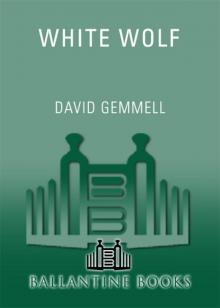 White Wolf
White Wolf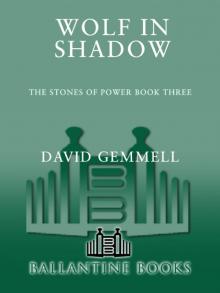 Wolf in Shadow
Wolf in Shadow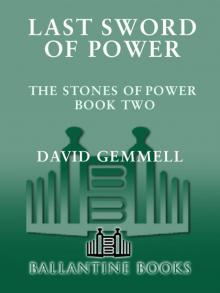 Last Sword of Power
Last Sword of Power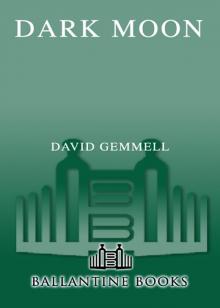 Dark Moon
Dark Moon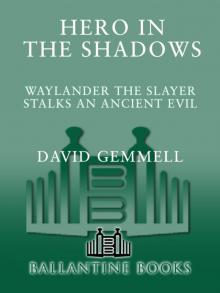 Hero in the Shadows
Hero in the Shadows Gemmell, David - Drenai 09 - Hero In The Shadows
Gemmell, David - Drenai 09 - Hero In The Shadows Waylander
Waylander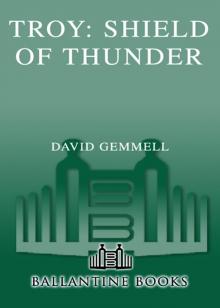 Shield of Thunder
Shield of Thunder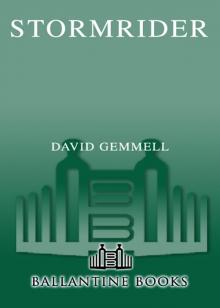 Stormrider Stormrider
Stormrider Stormrider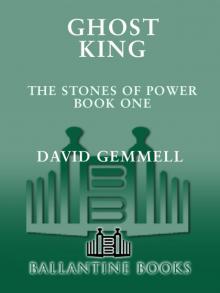 Ghost King
Ghost King Legend
Legend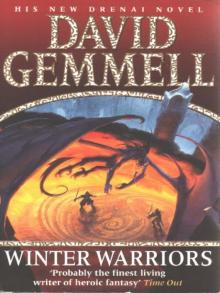 Winter Warriors
Winter Warriors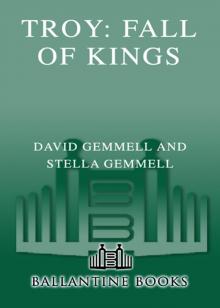 Fall of Kings
Fall of Kings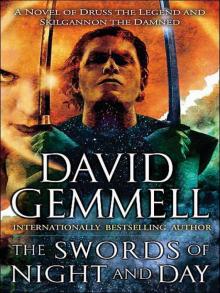 The Swords of Night and Day
The Swords of Night and Day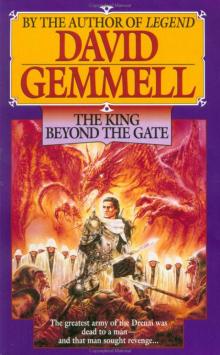 The King Beyond the Gate
The King Beyond the Gate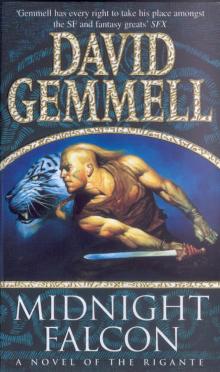 Midnight Falcon
Midnight Falcon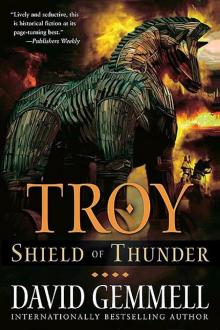 02 - Shield of Thunder
02 - Shield of Thunder In the Realm of the Wolf
In the Realm of the Wolf Ravenheart
Ravenheart The First Chronicles of Druss the Legend
The First Chronicles of Druss the Legend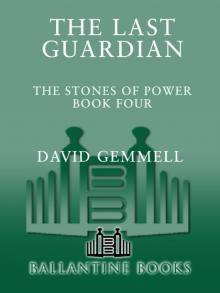 Last Guardian
Last Guardian Stormrider
Stormrider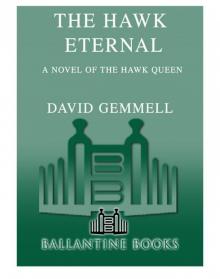 The Hawk Eternal
The Hawk Eternal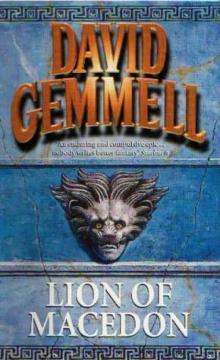 Lion of Macedon
Lion of Macedon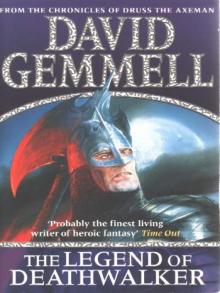 The Legend of Deathwalker
The Legend of Deathwalker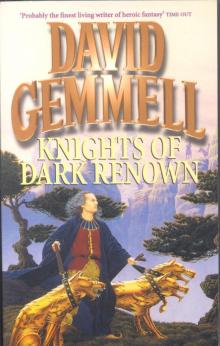 Knights of Dark Renown
Knights of Dark Renown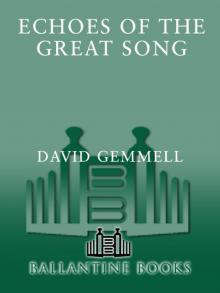 Echoes of the Great Song
Echoes of the Great Song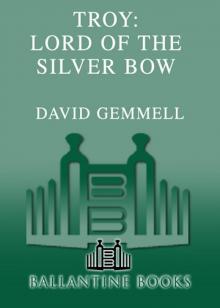 Lord of the Silver Bow
Lord of the Silver Bow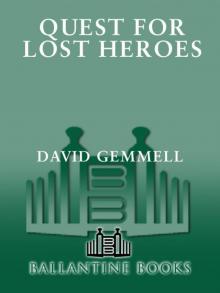 Quest for Lost Heroes
Quest for Lost Heroes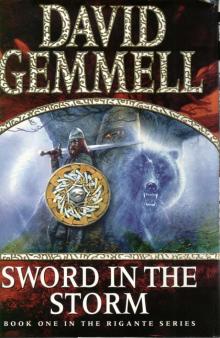 Sword in the Storm
Sword in the Storm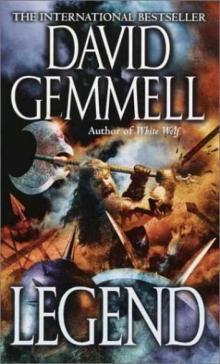 Drenai Saga 01 - Legend
Drenai Saga 01 - Legend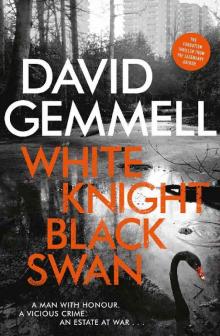 White Knight/Black Swan
White Knight/Black Swan![[Troy 02] - Shield of Thunder Read online](http://i1.bookreadfree.com/i/03/19/troy_02_-_shield_of_thunder_preview.jpg) [Troy 02] - Shield of Thunder
[Troy 02] - Shield of Thunder Lord of the Silver Bow t-1
Lord of the Silver Bow t-1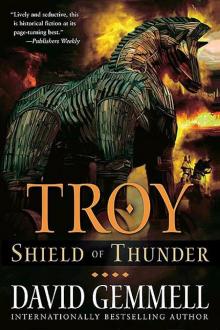 Shield of Thunder t-2
Shield of Thunder t-2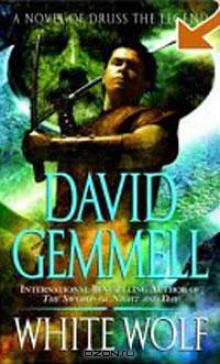 White Wolf: A Novel of Druss the Legend dt-10
White Wolf: A Novel of Druss the Legend dt-10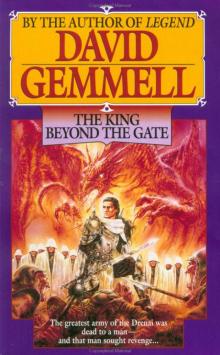 Drenai Saga 02 - The King Beyond the Gate
Drenai Saga 02 - The King Beyond the Gate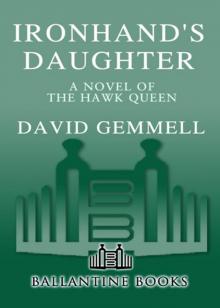 Ironhand's Daughter
Ironhand's Daughter Gemmell, David - Drenai 06 - The First Chronicles of Druss the Legend
Gemmell, David - Drenai 06 - The First Chronicles of Druss the Legend The Last Guardian
The Last Guardian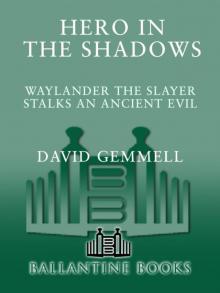 Hero in the Shadows: A Waylander the Slayer Novel
Hero in the Shadows: A Waylander the Slayer Novel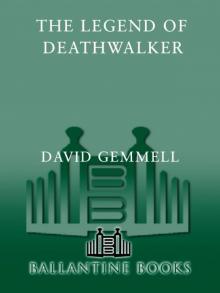 The Legend of the Deathwalker
The Legend of the Deathwalker